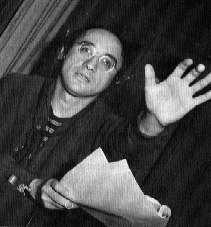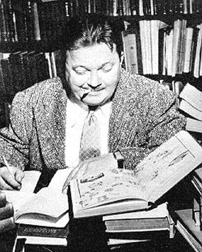


CLICK TO DOWNLOAD QUICKTIME PLAYER
|
First show date: 17/06/1936 |
|
Last show date: 06/08/1947 |
|
Number of shows: 216 |
![]()
![]()
![]()
synposis
|
Lights Out was created in Chicago by writer Wyllis Cooper in 1934, and the first series of shows (each 15 minutes long) ran on a local NBC station, WENR. By April 1934, the series was expanded to a half hour in length and moved to midnight Wednesdays. In January 1935, the show was discontinued in order to ease Cooper's workload (he was then writing scripts for the network's prestigious Immortal Dramas program), but was brought back by huge popular demand a few weeks later. After a successful tryout in New York City, the series was picked up by NBC in April 1935 and broadcast nationally, usually late at night and always on Wednesdays. Cooper stayed on the program until June 1936, when another Chicago writer, Arch Obler, took over. There are no known recordings from Cooper's 1934-1936 run, but his less gruesome scripts were occasionally rebroadcast. An interesting example is his "Three Men," which had aired on Christmas 1935, was performed again on the series in 1937 (a version circulates among collectors under titles like "Uninhabited" or "Christmas Story"), and was revived for a 1948 episode of NBC's prestigious "Radio City Playhouse" anthology series. The show benefited tremendously from Chicago's considerable pool of creative talent. The city was, with New York, one of the main centers of radio production in 1930s America. Among the actors who participated regularly during the Cooper era were Sidney Ellstrom, Art Jacobson, Don Briggs, Bernardine Flynn, Betty Lou Gerson, and Betty Winkler. The sound effects technicians frequently had to perform numerous experiments to achieve the desired noises. Cooper once had them build a gallows and wasn't satisfied until one of the sound men personally dropped through the trap. The series had little music scoring save for the thirteen chime notes that opened the program (after a deep voice intoned, "Lights out, everybody!") and an ominous gong which was used to punctuate a scene and provide the transition to another. When Cooper departed, his replacement, a young, eccentric and ambitious Arch Oboler, picked up where he left off, often following Cooper's general example but investing the scripts with his own style and concerns. Oboler made imaginative use of stream of consciousness narration and sometimes introduced social and political themes that reflected his commitment to anti-fascist liberalism. Although in later years Lights Out would be closely associated with Oboler, he was always quick to credit Wyllis Cooper as the series' creator and spoke highly of the older author, calling him "the unsung pioneer of radio dramatic techniques" and the first person Oboler knew of who understood that radio drama could be an art form. Other tales from Oboler's 1936-1938 run include: "War Horse," about a vengeful military nag named Joan of Arc who tramples a man to death; "The Flame Men," about creatures from the sun who infest the earth; "Front," in which "supernatural forces take over a suite in a world famous hotel." Like Cooper, Oboler was much in demand and highly prolific. While working on Lights Out, he wrote numerous dramatic sketches for variety shows, anthologies (The First Nighter) and specials, as well as Lady Counselor, a series about a woman lawyer, starring Irene Rich. In August 1936, singer Vallee, then the dean of variety show hosts, claimed that Lights Out was his favorite series. Subsequently, Oboler redrafted some of his Lights Out scripts for use on Vallee's and other variety hours. Despite acclaim for Oboler's dramas, NBC announced it was canceling the series in the summer of 1937 -- "just to see whether listeners are still faithful to it" -- but another outcry from fans forced the program back on the air that September for another year. In the spring of 1938, the series earned a good deal of publicity for its fourth anniversary as a half-hour show when actor Boris Karloff, the star of many a Hollywood horror film, traveled to Chicago to appear in five consecutive episodes. Oboler left in the summer of 1938 to pursue other projects, writing and directing several critically acclaimed dramatic anthology series -- Arch Oboler's Plays, Everyman's Theatre and Plays for Americans. A variety of NBC staff writers and freelancers filled in until Lights Out was canceled in 1939. NBC Chicago continuity editor Ken Robinson supervised some of the writing. Regular contributors included William Fifield and Hobart Donovan. A recording of the fifth anniversary show survives from this season. "The Devil's Due" by Donovan, about criminals haunted by a mysterious stranger, is predictable but in keeping with the formula laid down by Cooper. In 1942, Oboler, needing money, revived the series for a year on CBS. Airing in prime time instead of late at night, the program was sponsored by the makers of Ironized Yeast. Most of the Lights Out recordings that exist today come from this version of the show. For this revival, each episode began with an ominously tolling bell, over which Oboler read the cryptic tagline: "It...is...later...than...you...think." This was followed by a dour "warning" to listeners to turn off their radios if they felt their constitutions were too delicate to handle the frightening tale that was about to unfold. Naturally, the intended -- and successful -- effect of this was more tantalizing than off-putting. Directing and hosting the 1942-1943 broadcasts from New York and Hollywood, Oboler not only reused old scripts from his 1936-1938 run but also revived some of the more fantasy-oriented plays from his other, more recent, anthology series. Some of the most interesting episodes had originally aired on the author's groundbreaking, critically acclaimed 1939-1940 program Arch Oboler's Plays, among them: "The Ugliest Man in the World," a sentimental tale of a hideously deformed man seeking love in a cruel world, inspired by gentle Boris Karloff's typecasting in horror roles, and enlivened by strikingly expressionistic dramatic effects; "Profits Unlimited," a still-relevant allegory on the promises and dangers of capitalism; "Bathysphere," a political thriller about a scientist and a dictator sharing a deep sea diving bell; "Visitor from Hades," about bickering married couple trapped in their apartment by a hellhound. Another unusual script, "Execution," about a mysterious French woman who bedevils the Nazis who are trying to hang her, had previously aired on Oboler's wartime propaganda series Plays for Americans. The success of Oboler's 1942-1943 Lights Out revival was part of a trend in 1940s American radio toward more horror. Genre series like Inner Sanctum and Suspense and others drew increasingly large ratings. Perhaps with this in mind, NBC broadcast another Lights Out revival series from New York in the summer of 1945, using eight of Wyllis Cooper's original 1930s scripts. Like Oboler's, this revival aired in the early evening and not late at night, and because of this, it was reported, "only those Cooper scripts which stressed fantasy rather than horror" were broadcast. These included a bloodless ghost story about a man who accidentally condemns his dead wife to haunt a nearby cemetery and "The Rocket Ship," science fiction involving interstellar travel. Cooper, then an advertising executive at New York's Compton Agency, may have had little or nothing to do with the actual broadcasts other than allowing his scripts to be performed. This was followed by another eight-episode revival in the summer of 1946, from NBC Chicago, although at least one of the scripts is not by Cooper. In 1947, Cooper created Quiet Please, another fine radio program dealing with the supernatural, which he wrote and directed until 1949, occasionally borrowing ideas from his Lights Out stories while creating wholly new scripts that were often more sophisticated than his 1930s originals. In 1949 and 1950, he produced and contributed scripts to three live TV series that frequently dealt with the supernatural: Volume One, Escape and Stage 13. |
episodes
|
![]() Copyright(C) 2007
- 2020. All rights reserved.
Copyright(C) 2007
- 2020. All rights reserved.